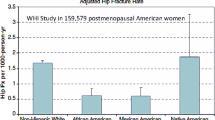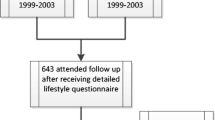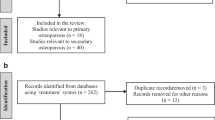Abstract
Hip fracture is the most disastrous osteoporotic fracture, characterized by high mortality, morbidity and institutionalization for the patient and by high economic costs for the health care system. The morphology of the upper part of the femur can influence the risk of hip fracture, e.g., a longer femoral neck is associated with a higher risk of cervical fractures, but not trochanteric ones. In this study, we evaluated the prediction of hip fracture risk by morphological parameters estimated from DXA measurements, and we compared their predictive value for cervical and trochanteric fractures in elderly women by reanalyzing previously published data (Duboeuf et al. J Bone Miner Res 1997 12 1895). This nested case-control study was performed in 232 elderly community-dwelling women from the EPIDOS cohort, including 65 women who sustained a hip fracture. After adjustment for confounding variables, women who sustained a cervical fracture had lower areal bone mineral density (aBMD), lower cortical thickness and a higher average buckling ratio ( P <0.005 for all) as well as longer femoral neck ( P <0.01) than controls. Women who sustained a trochanteric fracture had lower aBMD, lower cortical thickness and higher buckling ratio than controls ( P <0.0001) and than women who sustained a cervical fracture ( P <0.05). Their bending resistance (cross-sectional moment of inertia—CSMI, section modulus) was significantly lower in comparison with controls ( P <0.05–0.001). A decrease in aBMD, cortical thickness, CSMI and section modulus as well as an increase in buckling ratio were predictive of all hip fractures (OR –1.42–2.46 per 1 SD, P <0.05–0.0001), but the ORs for all structural parameters were markedly higher for trochanteric than for cervical fractures. CSMI and section modulus were predictive of trochanteric, but not cervical fractures. However, aBMD was strongly correlated with the CSA, cortical thickness and buckling ratio ( r 2>0.74), which suggests that they convey the same information. CSMI and section modulus correlated with aBMD more weakly, but their OR lost statistical significance after adjustment for aBMD. In conclusion, low femoral neck aBMD, CSA and cortical thickness as well as a high buckling ratio are associated with the higher risk of hip fracture, especially trochanteric ones. These indices are highly correlated with aBMD and convey the same message. The calculated CSMI and section modulus predict trochanteric fractures, but not cervical fractures, and their statistical significance is lost after adjustment for aBMD, indicating that they reflect mainly aBMD, not mechanical properties. Thus, the independent contribution of the external diameter of the femoral neck to the risk of hip fracture cannot be reliably estimated by this technique.
Similar content being viewed by others
References
Center JR, Nguyen TV, Schneider D, Sambrook PN, Eisman JA (1999) Mortality after all major types of osteoporotic fracture in men and women: an observational study. Lancet 353:878–882
Haentiens P, Autier P, Barette M, Boonen S (2002) The economic costs of hip fractures among elderly women. J Bone Jt Surg 83A:493–500
Schürch MA, Rizzoli R, Mermillod B, Vasey H, Michel JP, Bonjour JP (1996) A prospective study on socioeconomic aspects of fracture of the proximal femur. J Bone Miner Res 11:1935–1942
Greenspan SL, Myers ER, Kiel DP, Parker RA, Hayes WC, Resnick NM (1998) Fall direction, bone mineral density, and function: risk factors for hip fracture in frail nursing home elderly. Am J Med 104:539–545
Laet CEDH de, van Hout BA, Burger H, Weel AEAM, Hofman A, Pols HAP (1998) Hip fracture prediction in elderly men and women: validation in the Rotterdam study. J Bone Miner Res 13:1587–1593
Nevitt MC, Cummings SR (1993) Type of fall and risk of hip and wrist fractures: the Study of Osteoporotic Fractures. J Am Geriatr Soc 41:1226–1234
Seeley DG, Browner WS, Nevitt MC, Genant HK, Scott JC, Cummings SR (1991) Which fractures are associated with low appendicular bone mass in elderly women? Ann Intern Med 115:837–842
Beck TJ, Looker AC, Ruff CB, Sievanen H, Wahner HW (2000) Structural trends in the aging femoral neck and proximal shaft: analysis of the Third National Health and Nutrition Examination Survey dual-energy X-ray absorptiometry data. J Bone Miner Res 15:2297–2304
Kaptoge S, Dalzell N, Loveridge N, Beck TJ, Khaw KT, Reeve J (2003) Effects of gender, anthropometric variables, and aging on the evolution of hip strength in men and women aged over 65. Bone 32:561–570
Hillier TA, Beck TJ, Oreskovic T, Rizzo JH, Pedula KL, Black D, Stone KL, Cauley JA, Bauer DC, Taylor BC, Cummings SR (2003) Predicting long term hip fracture risk with bone mineral density and hip structure in post-menopausal women: the Study of Osteoporotic Fractures (SOF). J Bone Miner Res 18 [Suppl 2 S21] (abstract):1074
Rivadeneira F, Houwing-Duistermaat JJ, Beck TJ, Janssen JAMJL, Hofman A, Pols HAP, van Duijn CM, Uitterlinden AG (2004) The influence of an insulin-like growth factor I gene promoter polymorphism on hip bone geometry and the risk of nonvertebral fracture in the elderly: the Rotterdam study. J Bone Miner Res 19:1280–1290
Yates LB, Beck TJ, Broe KE, Bouxsein ML, Kiel DP (2003) Hip structure analysis (HSA) predicts risk for incident hip fracture in the nursing home. J Bone Miner Res 18 [Suppl 2 S55] (abstract):1215
Mautalen CA, Vega EM, Einhorn TA (1996) Are the etiologies of cervical and trochanteric hip fractures different? Bone [Suppl] 18:S133–S137
Greenspan SL, Lyers ER, Maitland LA, Kido TH, Krasnow MB, Hayes WC (1994) Trochanteric bone mineral density is associated with type of hip fracture in the elderly. J Bone Miner Res 9:1889–1894
Pande I, O’Neill TW, Pritchard C, Scott DL, Woolf AD (2000) Bone mineral density, hip axis length and risk of hip fracture in men: results from the Cornwall hip fracture study. Osteoporos Int 11:866–870
Partanen J, Jämsä T, Jalovaara P (2001) Influence of the upper femur and pelvic geometry on the risk and type of hip fractures. J Bone Miner Res 16:1540–1546
Stewart A, Porter RW, Primrose WR, Walker LG, Reid DM (1999) Cervical and trochanteric hip fractures: bone mass and other parameters. Clin Rheumatol 18:201–206
Dubeouf F, Hans D, Schott AM, Kotzki PO, Favier F, Marcelli C, Meunier PJ, Delmas PD (1997) Different morphometric and densitometric parameters predict cervical and trochanteric hip fracture: the EPIDOS study. J Bone Miner Res 12:1895–1902
Glüer CC, Cummings SR, Pressman A, Li J, Glüer K, Faulkner KG, Grampp S, Genant HK (1994) Prediction of hip fractures from pelvic radiographs: the Study of Osteoporotic Fractures. J Bone Miner Res 9:671–677
Pulkkinen P, Partanen J, Jelovaara P, Jämsä T (2004) Combination of bone mineral density and upper femur geometry improves the prediction of hip fracture. Osteoporos Int 15:274–280
Dargent-Molina P, Favier F, Grandjean H, Baudoin C, Schott AM, Hausherr E, Meunier PJ, Bréart G (1996) Fall-related factors and risk of hip fracture: the EPIDOS prospective study. Lancet 348:145–149
Hans D, Dargent-Molina P, Chott AM, Sebert JL, Cormier C, Kotzki PO, Delmas PD, Pouilles JM, Bréart G, Meunier PJ (1996) Ultrasonographic heel measurements to predict hip fracture in elderly women: the EPIDOS prospective study. Lancet 348:511–514
Szulc P, Uusi-Rasi K, Claustrat B, Marchand F, Beck TJ, Delmas PD (2004) The role of sex steroids in the regulation of bone morphology in men. The MINOS study. Osteoporos Int 15:907–917
Szulc P, Garnero P, Marchand F, Dubeouf F, Delmas PD (2005) Biochemical markers of bone formation reflect endosteal bone loss in elderly men—MINOS study. Bone 36:13–21
Belsley DA, Kuh E, Welsch RE (1980) Regression diagnostics: identifying influential data and sources of colinearity. John Wiley, New York
Bouxsein ML, Palermo L, Yeung C, Black DM (2002) Digital X-ray radiogrametry predicts hip, wrist and vertebral fracture risk in elderly women: a prospective analysis from the Study of Osteoporotic Fractures. Osteoporos Int 13:358–365
Center JR, Nguyen TV, Pocock NA, Noakes KA, Kelly PJ, Eisman JA, Sambrook PN (1998) Femoral neck axis length, height loss and risk of hip fracture in males and females. Osteoporos Int 8 75–81
Nguyen T, Sambrook P, Kelly P, Jones G, Lord S, Freund J, Eisman J (1993) Prediction of osteoporotic fractures by postural instability and bone density. BMJ 307:1111–1115
Schott AM, Cormier C, Hans D, Favier F, Hausherr E, Dargent-Molina P, Delmas PD, Rinot C, Sebert JL, Bréart G, Meunier PJ (1998) How hip and whole-body bone mineral density predict hip fracture in elderly women: the EPIDOS prospective study. Osteoporos Int 8:247–254
Filardi S, Zebaze RMD, Duan Y, Edmonds J, Beck TJ, Seeman E (2004) Femoral neck fragility in women has its structural and biomechanical basis established by periosteal modeling during growth and endocortical remodeling during aging. Osteoporos Int 15:103–107
Bell KL, Loveridge N, Power J, Garrahan N, Stanton M, Lunt M, Meggitt B, Reeve J (1999) Structure of the femoral neck in hip fracture: cortical bone loss in the inferoanterior to superoposterior axis. J Bone Miner Res 14:111–119
Crabtree N, Loveridge N, Parker M, Rushton N, Power J, Bell KL, Beck TJ, Reeve J (2001) Intracapsular hip fracture and the region-specific loss of cortical bone: analusis by peripheral quantitative computed tomography. J Bone Miner Res 16:1318–1328
Yoshikawa T, Turner CH, Peacock M, Slemenda CW, Weaver CM, Teegarden D, Markwardt P, Burr DB (1994) Geometric structure of the femoral neck measured using dual-energy X-ray absorptiometry. J Bone Miner Res 9:1053–1064
Peacock M, Liu G, Carey M, Ambrosius W, Turner CH, Hui S, Johnston CC Jr (1998) Bone mass and structure at the hip in men and women over the age of 60 years. Osteoporos Int 8:231–239
Monaco M di; di Monaco R, Mautino F, Cavanna A (2002) Femur bone mineral density, age and fracture type in 300 hip fractures women. Aging Clin Exp Res 14:47–51
Lundeen GA, Knech SL, Vajda EG, Bloebaum RD, Hofmann AA (2001) The contribution of cortical and cancellous bone to dual-energy X-ray absorptiometry measurements in the female proximal femur. Osteoporos Int 12:192–198
Kuiper JW, van Kuijk C, Grashuis JL (1997) Distribution of trabecular and cortical bone related to geometry. A quantitative computed tomography study of the femoral neck. Invest Radiol 32:83–89
Zebaze RM, Welsh F, Iuliano-Burns S, Evans A, Seeman E (2004) The femoral neck is ellipsoid: the assumption of circularity or parallelepipedal shape introduces errors in volume and volumetric bone mineral density. J Bone Miner Res 19 [Suppl 1] (abstract M099):S366
Peacock M, Turner CH, Liu G, Manatunga AK, Timmerman L, Johnston CC Jr (1995) Better discrimination of hip fracture using bone density, geometry and architecture. Osteoporos Int 5:167–173
Bergot C, Bousson V, Meunier A, Laval-Jeantet M, Laredo JD (2002) Hip fracture risk and proximal femur geometry from DXA scans. Osteoporos Int 13:542–550
Gnudi S, Ripamonti C, Gualtieri G, Malavolta N (1999) Geometry of proximal femur in the prediciton of hip fracture in osteoporotic women. Br J Radiol 72:729–733
Faulkner KG, Cummings SR, Black D, Palermo L, Glüer CC, Genant HK (1993) Simple measurement of femoral geometry predicts hip fracture: the Study of Osteoporotic Fractures. J Bone Miner Res 8:1211–1217
Gomez Alonso C, Diaz Curiel M, Hawkins Carranza F, Perez Cano R, Diez Perez A (2000) Femoral bone mineral density, neck-shaft angle and mean femoral neck width as predictors of hip fracture in men and women. Osteoporos Int 11:714–720
Michelotti J, Clark J (1999) Femoral neck length and hip fracture risk. J Bone Miner Res 14:1714–1720
Dretakis EK, Papakitsou E, Kontakis GM, Dretakis K, Psarakis S, Steriopoulos KA (1999) Bone mineral density, body mass index, and hip axis length in postmenopausal cretan women with cervical and trochanteric fractures. Calcif Tissue Int 64:257–258
Calis HT, Eryavuz M, Calis M (2004) Comparison of femoral geometry among cases with and without hip fracture. Yonsei Med J 45:901–907
Karlsson KM, Sernbo I, Obrant KJ, Redlund-Johnell I, Johnell O (1996) Femoral neck geometry and radiographic signs of osteoporosis as predictors of hip fracture. Bone 18:327–330
Seeman E, Duan Y, Fong C, Edmonds I (2001) Fracture site-specific deficits in bone size and volumetric density in men with spine or hip fractures. J Bone Miner Res 16:120–127
Karlamangla AS, Barrett-Connor E, Young J, Greendale GA (2004) Hip fracture risk assessment using composite indices of femoral neck strength: the Rancho Bernardo study. Osteoporos Int 15:62–70
Mayhew P, Kaptoge S, Loveridge S, Power J, Kroger HPJ, Parker M, Reeve J (2004) Discrimination between cases of hip fracture and controls is improved by hip structural analysis compared to areal bone mineral density. An ex vivo study of the femoral neck. Bone 34:352–361
Kotowicz MA, Melton LJ III, Cooper C, Atkinson EJ, O’Fallon WM, Riggs BL (1994) Risk of hip fracture in women with vertebral fracture. J Bone Miner Res 9:599–565
Acknowledgement
The authors thank Dr. Mary Bouxsein, Harvard University, Cambridge, Mass., for the careful reading of the manuscript and the helpful comments and discussions.
Author information
Authors and Affiliations
Corresponding author
Rights and permissions
About this article
Cite this article
Szulc, P., Duboeuf, F., Schott, A.M. et al. Structural determinants of hip fracture in elderly women: re-analysis of the data from the EPIDOS study. Osteoporos Int 17, 231–236 (2006). https://doi.org/10.1007/s00198-005-1980-7
Received:
Accepted:
Published:
Issue Date:
DOI: https://doi.org/10.1007/s00198-005-1980-7




